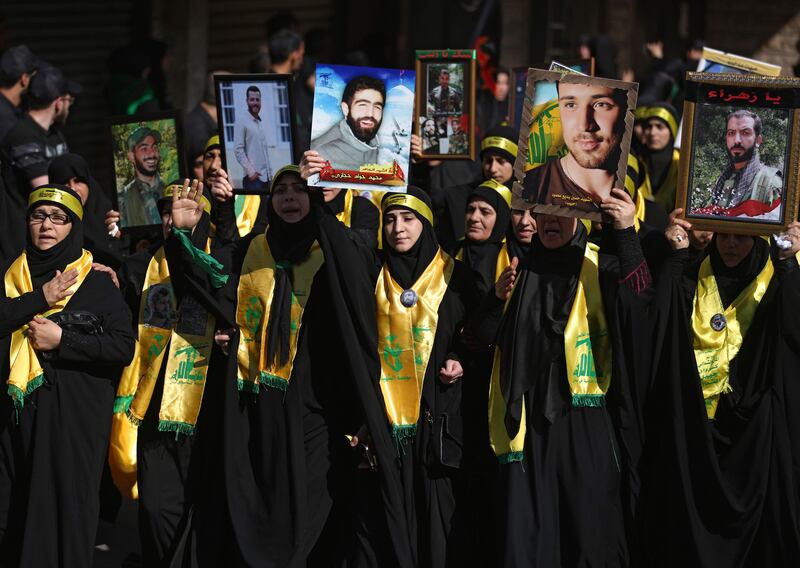Beirut // Hizbollah leader Hassan Nasrallah said his group had suffered “a lot of sacrifices” in the Syrian war as hundreds of thousands of Lebanese Shiites gathered on Sunday across the country to mark Ashura.
The largest celebration was held in Beirut’s Hizbollah-controlled southern suburbs, and though Lebanese TV station Al Manar reported that Mr Nasrallah had attended that ceremony in person, he addressed the crowd by video feed.
Security for the event was heavy, with the Lebanese military closing roads to the neighbourhoods where the celebrations were held and Hizbollah personnel providing security within that cordon. Beirut’s predominantly Shiite southern suburbs — known locally as Dahiyeh — have previously been the target of attacks by Sunni extremists.
In 2014 and 2015, militants detonated car bombs in Dahiyeh, killing dozens in attacks that were viewed as retribution for Hizbollah’s military intervention on behalf of the Syrian government in that country’s civil war.
Ashura, which falls on the 10th day of the Islamic month of Muharram, marks the death of Imam Hussein, the grandson of the prophet Mohammed, near the city of Karbala in Iraq in 680 AD. It is a day of mourning for Shiites, but also a potent political symbol. In Lebanon and elsewhere in the region, Shiite communities link the death of Imam Hussein at the hands of a Sunni caliph to present-day oppression of Shiites.
A Hizbollah spokeswoman said the large turnout was proof the group had not lost support as a result of its participation in Syria’s civil war. Hizbollah first began fighting openly on behalf of Bashar Al Assad in 2013, exacerbating sectarian and political tensions within Lebanon and causing some analysts to suggest the group might alienate its base of support by turning its focus away from its traditional role of fighting Israel.
“It proves that people who claimed the support of Hizbollah had weakened were wrong,” the spokeswoman said.
Many of those in attendance held pictures of Hizbollah fighters who have died in Syria. The Syrian Observatory for Human Rights, which monitors the conflict, estimates that as of March of this year, the group has lost at least 1,400 fighters.
Hizbollah’s political fortunes have changed since 2013 as the rebellion against Mr Al Assad became more radicalised, allowing Hizbollah to characterise them as takfiris — literally, “excommunicators” — who consider Shiites apostates.
The idea that Hizbollah was battling an existential threat to Shiites rather than intervening to save Mr Al Assad gained further currency in 2014 when fighters from ISIL and groups affiliated with Al Qaeda began threatening cities and towns in northern Lebanon and briefly captured the city of Arsal.
A few months ago, Hizbollah and the Lebanese army drove the last fighters from those groups out of northern Lebanon, even forcing some of Hizbollah’s staunchest political enemies in Lebanon to praise the group.
Mr Nasrallah addressed Syria’s war and ISIL in his speech on Saturday.
“ISIL is incapable of regaining territory. The group is trying to exhaust the Syrian army in order to delay its end,” Mr Nasrallah said. “However, this plan is ineffective because the decision to wipe out ISIL has been taken. Yes, there are a lot of sacrifices, but this is the nature of the battle.”
Though ISIL has suffered heavy losses in recent months, the Syrian Observatory said on Sunday that Hizbollah had lost at least 20 more fighters in eastern Syria since Thursday during battles against ISIL. It also reported that ISIL had managed to regain small pieces of territory in different parts of Syria as it launched counterattacks against the Syrian government and its allies.
On Saturday, Mr Nasrallah reiterated his group’s commitment to defeating ISIL.
“Battles against ISIL wherever it exists must continue till eradicating the takfiri group,” Mr Nasrallah said.
He also took aim at Hizbollah’s more traditional enemies – Israel and the US.
"Division is America's real project in the region, and we must know that we are in the hands of an American administration that is the cause of the tragedies," Mr Nasrallah said.
On Friday, Mr Nasrallah suggested the recent referendum on the question for independence in Iraqi Kurdistan was a US and Israeli plot.
Touching on more local concerns, Mr Nasrallah reiterated his support for Lebanese parliamentary elections that are scheduled for next year. Parliament has postponed elections twice since 2014.
He also praised a decision by Lebanese prime minister Saad Hariri’s government on Friday to cancel a planned tax increase and to begin issuing promised pay increases for government employees.
Delays in approving a pay increase have led to intermittent strikes in recent months, culminating in walkouts that kept many Lebanese government offices last week. Air traffic controllers had threatened to strike and shut down Beirut’s airport if the issue was not resolved by Monday.





